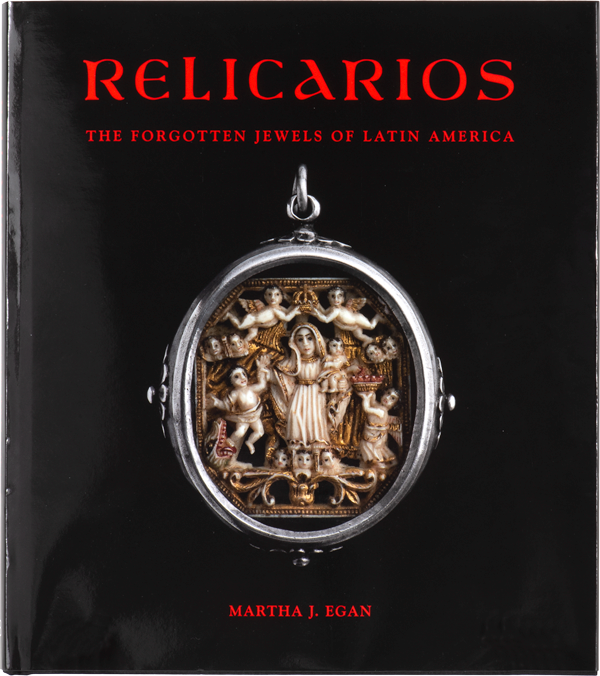Q: You’ve said that your novel Clearing Customs is based on your experiences as an importer of Latin American folk art for your store, Pachamama in Santa Fe. After over 30 years in the business and two nonfiction books on folk art, what inspired you to write a book like this ?
A: A really hideous campaign of harassment from US Customs. In the mid-80s, when President Reagan ramped up the War on Drugs, the pleasant, competent Customs cargo inspectors I had dealt with for years were replaced by armed Robo-cops who clearly suspected that small import operations like mine must be fronts for drug running. Then in 1983, Reagan signed the Cultural Property Act that attempted to halt the illegal importing of stolen art and works considered to be national patrimony in their countries of origin. While this is a serious problem, especially between wealthy and developing countries, the definition of “valuable cultural property” is hopelessly vague. US Customs officers are not art experts and are ill-equipped to judge. They often think anything old is an irreplaceable archaeological treasure or mistakenly confiscate brand-new goods. Importers scoff at their ineptitude. But it’s not all that funny when gun-toting Customs agents raid import businesses and terrorize honest, decent people who have not broken the law.
Q: Couldn’t you protest?
A: Small importers–by nature unorganized, unconnected, and underfunded–are easy targets. Of course we protested. Things just got worse. I think Customs was intentionally trying to drive us out of business. Many importers quit.
Q: But not you?
A: No, I’m stubborn! I had spent years developing markets for Latin American cottage industries and their handicrafts helped me develop a business that I loved. I made as much noise as I could. I met with the Cultural Patrimony Committee in Washington to let them know their legislation was having disastrous consequences, both for small importers and third-world artisans. I complained to New Mexico Congressman Manuel Lujan about intentional damage to a shipment specially created for a demonstration at The Museum of International Folk Art. In retaliation Customs asserted that I was a Pre-Columbian art smuggler. The harder I fought the injustices, the harder they came down on me.
Q: What exactly did they do to you?
A: First, there was the stalking. People who were nothing like my regular customers began to visit my store: men with military haircuts and aviator shades; tough, humorless women. They were often arrogant, hostile, and as obvious as black beans in a bowl of white rice. They tried to photograph our inventory. They insinuated that I was involved in illegal activities. They magically showed up whenever other importers called on me. They followed me everywhere: to the grocery store, the bank, the Post Office. They photographed me. They slit open my mail and packages, even things mailed in the US My car was repeatedly vandalized. My telephone buzzed with interference and echoes. When I told my callers it was probably Nazis from US Customs, the connection was abruptly severed. Weirdness has become a daily aspect of my life.
Q. How did this harassment affect your business?
A: The bizarre visitors upset my employees and me. I quit waiting on customers, and lost sales. When Customs began hassling my suppliers in Latin America, who are mostly poor and powerless, I had to stop importing. I gave up wholesaling and bought my inventory stateside where it was more expensive and less original. I no longer felt safe traveling in Latin America, where 5 bucks to the right guy could get me tossed into prison on trumped up drug charges.
Q: Is Customs still hassling you?
A. Yes. Even now when I travel, strangers cozy up to me on airplanes, try to read what I’m writing, grill me about my travels, my politics, my personal life. Especially in South America, a person who was on the plane with me will show up at my out-of-the-way hotel. He will invite himself to my restaurant table, ask to accompany me to visit suppliers, fly with me on tiny planes to other cities on my itinerary, hop into cabs with me, follow me around shops where I’m buying. I do my best to shake them, but it’s not always possible. Men don’t usually latch onto me without an ulterior motive. I am not a guy magnet.
Q: Couldn’t you sue Customs?
A: I tried. When they refused to give me my files through the Freedom of Information Act, I brought suit in Federal District Court in DC. The upshot was that for several hundred dollars, Customs agreed to release documents, then smugly sent me illegible Xeroxes of my own letters to them. In reality you can’t sue the federal government, especially when you can’t totally prove they’re hassling you. They’re omnipotent, and thanks to us taxpayers, they have bottomless pockets.
After years of hoping that lawyers and private detectives could help me, I finally realized that if I’m not going to get justice, I can at least get even. For years, I’d kept detailed notes–for myself as a means of taking hold of a situation I couldn’t control, and for the record. It took me 16 years to create something positive out of all this material, but I’m proud to say it is an entertaining and wickedly funny book about the very serious, very timely issue of domestic spying.
Q: Why did you write a novel rather than a nonfiction account?
A: Fiction seemed like the most effective way of telling a difficult story. Nonfiction requires an author’s claims be independently verifiable. Witness the flap about memoirs that contain fallacies. I knew that I would never be able to get Customs to admit any of this. I was also curious about what could motivate the kind of abuse I suffered. I wanted to get inside the heads of the people who were harassing me, and understand why they would pour that kind of time and money into hassling a woman whose only “crime” was to embarrass them. I based Clearing Customs on my experiences, but in order to make the story work as fiction, I added things that didn’t actually happen. I have a lot of fun these days trying to sell my book to Customs guys. Writing well is the best revenge.
Q. OnLine Review of Books named Clearing Customs “Book of the Year 2005” for fiction. How did you feel about that?
A. I made a lot of joyful noise! I don’t know the OnLine people, but I know their interesting and independent-thinking site, and it rocks. They review a wide variety of books from mainstream publishers and unlike many reviewers, they don’t turn up their noses at small press books like mine. Somebody who’s not my mom gave Clearing Customs a big thumbs up!
Q. How do you interpret the recent revelations about government spying on US citizens?
A. Can I say I told you so? I am continually astonished that so many Americans don’t seem to understand how dangerous despotic legislation like the Patriot Bill and NSA’s wiretapping are for all of us–not just for putative terrorists or criminals. The War on Terrorism, the War on Drugs and before it, the War on Communism, are red herrings, campaigns of intimidation which enable the powerful to demonize critics and terrify, subdue, and control the people.
Q: Do you have any advice for the average person on how to avoid becoming the target of this kind of harassment?
A: Don’t put your head in the sand! Too many people foolishly believe they’ll be left alone if they turn a deaf ear and a blind eye to our government’s vindictiveness toward anyone who disagrees with its policies. WRONG! This regime has targeted ordinary people who work within the law for freedom and social justice, singling out antiwar protesters, African Americans, Native Americans, Muslims, Quakers, and uppity women like me. Their enemies list is infinitely expandable. If we don’t all stand in opposition to these demagogues, we may permanently lose our freedoms. I may be an incurable fool, but I’ll fight bastards like those who’ve harassed me until I draw my last breath.






